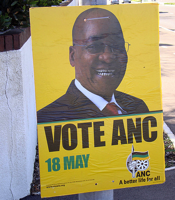Although extended periods of one-party dominance may be endorsed by voters in free and fair elections, they can also prove detrimental to the health of democratic government in various ways. Corruption -- in particular, the misappropriation of public resources for private gain -- is a pronounced feature of dominant-party systems and one of the more obvious means by which those systems can pose a threat to clean, transparent and efficient government. As South Africa’s African National Congress (ANC) celebrates its 100th anniversary and enters its 18th year in power, its experience in government is largely serving to confirm this familiar, if depressing, trend. There is now an unacceptably high level of corruption throughout South Africa’s public services and across all three tiers of its government: national, provincial and local. The downside of the ANC’s electoral dominance is that it cannot escape direct responsibility for this situation given its overwhelming power at each of those levels.
It helps to understand the exact nature and extent of South Africa’s corruption crisis and consider how it might be explained, in order to assess the prospects for corrective action. Such action is necessary if the country is to avoid becoming the dysfunctional state warned of not only by the opposition Democratic Alliance (DA), but also by senior figures from within the ANC itself. President Jacob Zuma can afford a certain indifference to the criticism emanating from the former, but he can hardly ignore the latter.
The Scale of the Corruption Crisis

